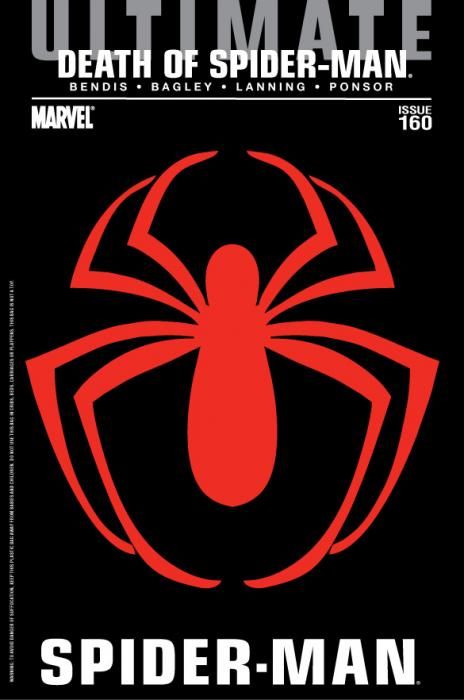Not a hoax! Not an imaginary story! Admittedly, it is happening in the Ultimate Universe so it isn't the real Peter Parker, but still: the Death of Spider-Man. That's what the cover promised, and that's what we get. A story that, to give Marvel their credit, couldn't be told in the Marvel Universe proper.
The big questions surrounding any death in comics is whether we believe it, and more importantly, whether it felt earned, rather than tacked on to lend some significance to an ailing storyline. When Johnny Storm "died" a few months ago, we didn't see him get fatally wounded, let alone witness a body. You could sail a cruise liner through the resurrection loopholes. Here, though? Spider-Man is killed, there's no getting around it. We see it happen. His friends and family see it happen. Sure, there's always a way back, but as far as comic book death scenes go, this is as believable as they come.
So did Bendis earn it? Not just in the pages beforehand, but stretching all the way back to his first issue? Again, it's an unequivocal yes. In Peter Parker's final issue, he, his friends and family all act exactly as they have throughout Bendis' run. They're stubborn, they're irrational, and they're usually more concerned with other people's safety than their own. In short, they act like real, good people would in exceptional circumstances. Confronted with a madman hell-bent on revenge, it could never have ended with anything other than someone's death -- and, finally, it did.
Still, all that would be for naught if the issue in which it happens wasn't actually fun to read; Thankfully, it is. This is Bendis at his indisputable best. With the emotional stakes pushing higher and higher, he piles on both character and action. One minute, you're cheering MJ's defiance. The next, you're anxious over Peter's tactical errors. There are even moments of humor. It is, after all, a Spider-Man story. In the aftermath, you're left wondering who really won this fight. Bendis has occasionally struggled to fuse large-scale action with personal emotion, but now, when it truly counts, he nails it at every turn, even resisting the obvious temptation to over-egg the key character beats. Peter's death is pitched near-perfectly, understated (no "See you soon, Uncle Ben!") but all the more poignant for it.
It certainly helps that Mark Bagley is on board for the issue. As a penciller, Bagley's mastery of storytelling craft is among the best in the industry. Indeed, only the best could imbue both an exploding truck and a motionless body with equal presence and passion, and yet Bagley makes it look easy. His history as the artist for the majority of "Ultimate Spider-Man's stories, is also significant. It makes this Peter Parker instantly recognizable as the one we followed for ten years or more.
And if there are complaints about the story, they're only minor. We see nothing of the death's true aftermath, which is going to be handled in "Ultimate Fallout." But then, why shouldn't it? This is a serial medium, and we should want to read the next part of the story. More disappointingly, though, there's nothing in the way of surprises, and not just because the mainstream news media had shown us the important page beforehand. We get the story we're promised, and nothing more. Was it unfair to expect something extra? Perhaps. But we probably did, anyway.
In any case, so ends an era, with writer and artist, hero and villain, friend and family member all at their absolute best. Even so, for all of this story's superlative execution, what should excite us as readers is the thought of what happens afterwards. Ultimate Peter Parker might be dead, but Ultimate Spider-Man will live on, and the stories that are coming will truly be treading fresh ground. That, in the end, is the only justification anyone really needed for killing Peter Parker -- and what it inspires will be the only true measure of how successful this story was.

